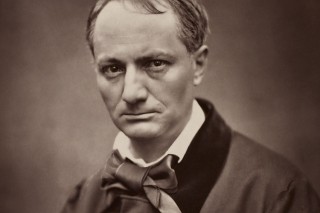Title
Subhead

Baudelaire’s influence extends to the musical domain as the Juilliard Songfest will reveal.
(Photo by Étienne Carjat)“How often music engulfs me like the sea,” Charles Baudelaire (1821-67) wrote in “La musique,” the first poem of his 1857 collection Les Fleurs du mal (Flowers of Evil). The collection’s decadent and prurient themes precipitated an obscenity trial resulting in a fine, but the succès du scandale helped the volume sell out within a year. Baudelaire’s prose-poetry, which brims with political, social, and sexual disaffection, influenced a generation of poets including Paul Verlaine, Arthur Rimbaud, and Stéphane Mallarmé, who appreciated Baudelaire’s symbolist world and sensitivity to modernity (modernité)—a term Baudelaire coined.
Body
Baudelaire’s influence extends as well to the musical domain, as Juilliard singers will reveal at the fourth annual Songfest, on December 4. Brian Zeger (M.M. ’81, piano), the artistic director of the Marcus Institute for Vocal Arts, curated the evening and will accompany the performers on Baudelaire settings by eight composers—Duparc, Chausson, Daron Hagen, Caplet, Fauré, Debussy, Alexander Gretchaninov, and Hindemith. In a recent interview, Zeger told The Journal that his goal was to give the four singers—soprano Christine Price, mezzo Virginie Verrez, countertenor Eric Jurenas, and tenor Miles Mykkanen—“a real immersion into one world of music.” And it’s a world with particular resonance for Zeger, who became captivated as a high school French student by “the raw spirit of rebellion” in Baudelaire’s writing. “Being a teenager myself and coming of age in the 1970s and ’80s, that spirit of rebellion, which really started in the ’60s, was still very much in the air,” he said.
Anchoring the evening are three of Debussy’s Cinq poèmes de Baudelaire, a canonical cycle of settings of poems from Les Fleurs du mal. Debussy’s treatments are thick with counterpoint and stylistically reveal the composer and the poet’s shared appreciation for the aesthetics of Richard Wagner. (Zeger said that after playing this cycle, he feels as though he’s “just played an act of Siegfried.”) Also on the program are works of Chausson and Fauré, which are typically Romantic harmonically and structurally; in contrast, those of Caplet are much more modern—harder, colder, and more angular and calculated. In fact, Caplet’s sonic language inclines toward that of Hindemith and Hagen, a contemporary American composer whose “Evening Twilight,” an English translation of Baudelaire’s “Le Crépuscule du soir” (“The Twilight of Evening”) from Les Fleurs du mal, will be performed. The rest of the settings are in French, and drama alum Austin Smith (Group 43) will recite English translations preceding each of them.
Though Baudelaire had no formal musical training, this mélange of composers exhibits the poet’s suitability to lyric adaptation. His “L’Invitation au voyage” appears twice on the program, “first as an invitation to consider matters of life and death” in a well-known setting by Duparc and then, in a much less familiar setting by Gretchaninov, “we are invited to a world of languorous erotic dreams,” Zeger wrote in his program notes. Who could resist this poet’s overture to reverie?




